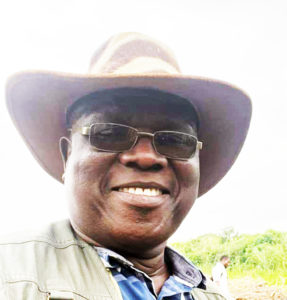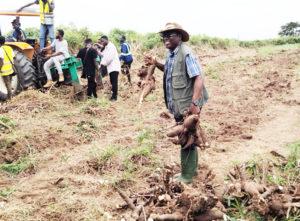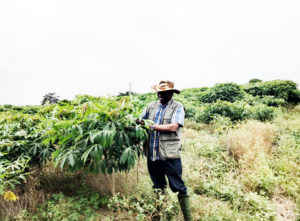
An Associate Professor in Agricultural Mechanisation says from a conservative estimate Ghana can earn over $3 billion from gari alone, $4 billion from starch and between $5 billion to $6 billion from bio-ethanol per one million hectares of the lead varieties of cassava (Manihot esculenta).
He has, therefore, recommended the establishment of a dedicated Cassava Research Institute, as well as a Cassava Marketing Board, just as it pertains with the Cocoa Marketing Board (COCOBOD), which will bring a big relief to the country and its neighbours as well.
Prof. Emmanuel Yaovi Hunnuor Bobobee of the Agricultural Machinery Engineering department of the Kwame Nkrumah University of Science and Technology (KNUST) said Africa produces about 60 percent of the global cassava production, but the continent is not even near 1 percent when it comes to export and value addition.
Prof. Bobobee, who has invented the TEK Mechanical Cassava Harvester, patented 17219 and championing the mechanisation of cassava production in Ghana and beyond, last week, Wednesday demonstrated how the cassava harvester works to The Chronicle, at the KNUST Agricultural Research Station at Anwomaso, near Kumasi.

Designed to harvest all tropical root and tuber crops, the TEK Harvester at the same time of harvesting also ploughs the field at the same time for the next cultivation, conserve energy and works best when the ground is hard.
Prof. Bobobee, who has a vast experience in agricultural equipment development and mechanisation with special interest in mechanised cassava production, said the idea is to alleviate the difficulties associated with the manual methods of cassava production by making the process easy, mechanised, smart and attractive.
His 17-acre cassava farm purposely for teaching and demonstration is cultivated with twelve cassava varieties out of about thirty elite cassava varieties developed by the Crop Research Institute of the CSIR, which are capable of yielding a minimum of 25 tons of cassava per hectare, as against 8 tons in the case of local varieties.

Prof. Bobobee, who was at the same time also practically demonstrating to a large number of final year agricultural engineering students of the faculty, explained that some of the developed elite cassava varieties can yield as much as 60 to 80 tons per hectare, when cultivated on ridges and properly spaced.
The Specialist Researcher in Agricultural Mechanisation, who is passionate about mechanizing cassava production elaborated that cassava is a reliable staple for us and can also be used as a
composite flour to make confectioneries and bread especially now that there are crisis about import of wheat from other parts of the world as a result of the Russia/Ukraine war.
The good thing about cassava, according to the professor, is that “the continent produces and consumes, unlike other products that we produce and look for external markets” and that, “improving a bit of its cultivation techniques would help produce more so that we can feed
ourselves and at the same time export”.
He, however, bemoaned that the state’s response to this laudable innovation is actually not encouraging or motivating at all instead of being a good by-product for government to invest in tertiary education at a time the universities are churning out more school graduates
without employment opportunities.

Prof. Bobobee suggested to government to align its agricultural policy alongside mechanization with cassava and support this innovation or invention which is capable of bringing rippling effects to the nation.
“It is the right time for government to invest in university researchers and inventors, and innovations that start businesses and can employ students”, emphasizing that manual production and harvesting of cassava cannot be sustained and does not make it attractive to the youth.
Prof. Bobobee’s department of Agricultural and Biosystems Engineering at KNUST is currently working on a cassava peeling machine (cassava peeler) to help farmers peel their harvested cassava quickly.
He said these are all start-up innovations that the government must step in to assist in order to create jobs for the teeming youth and graduates in the agricultural industry and also create wealth in the society.
In addition to the food types derived from cassava, the crop can also be used for bio-ethanol, artificial rice, animal feed, as starch for paper, plywood and textile industries and as binder for the pharmaceutical industry.
“It can also be used as a monosodium glutamate, artificial sweetener, an adhesive and a bio-plastic”, Prof. Bobobee enumerated.
From Thomas Agbenyegah Adzey, Anwomaso










